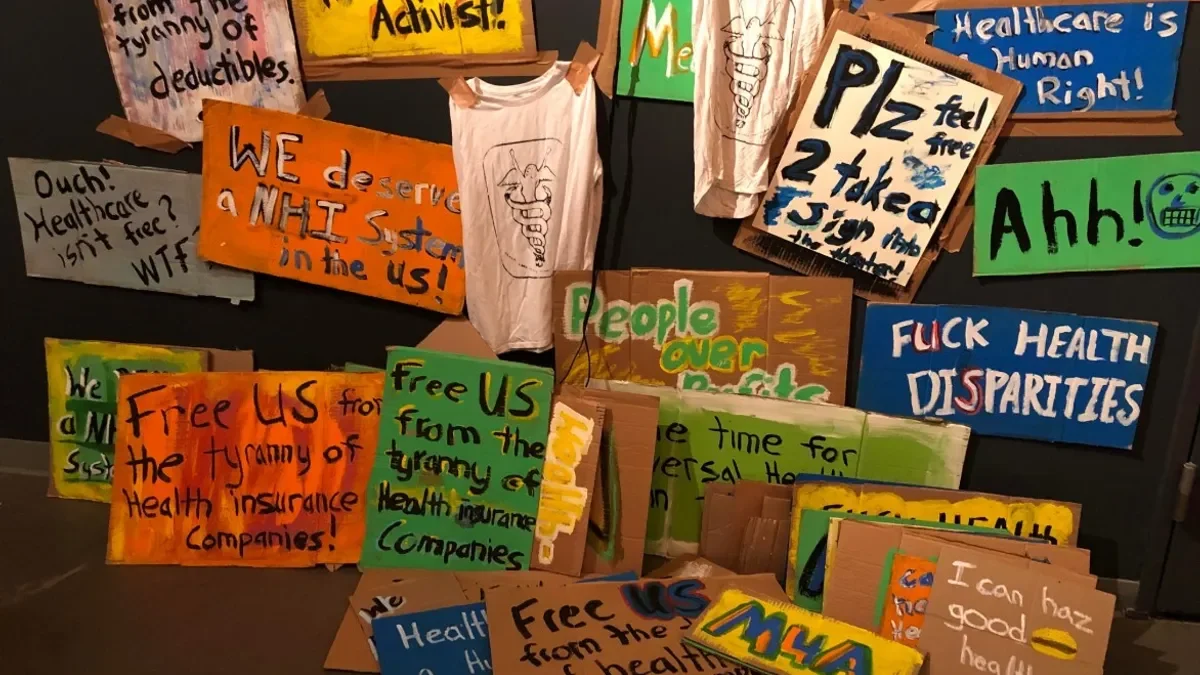Philly Fringe 2025: Philly’s Medicare for All Movement presents Healthcare Is a Human Right!
Philly Fringe 2025: Philly’s Medicare for All Movement presents Healthcare Is a Human Right!
By: SaraKay Smullens for the Broad Street Review
Three weeks before I walked into Healthcare Is a Human Right!, a Fringe show created by artists of Philly’s Medicare for All Movement (a grassroots healthcare advocacy group), I spent eight hours overnight in one of our city’s ERs. In the hopelessly crowded scene (thanks in part to the closure of Philly’s Hahnemann Hospital, whose ER served many Medicaid patients and uninsured people), I filled in for absent social workers and got splashed by vomit.
The US is the only country of its kind that doesn’t provide healthcare for its citizens, relying instead on a for-profit healthcare system and gouging insurance companies that produce rampant health disparities and disability injustice. So I was glad to enter the Louis Bluver Theatre for a Fringe show exposing the dangers of our cruel, discriminatory, totally broken healthcare system.
This moving and riveting interdisciplinary performance, featuring Genise Paige Deal, Aster Laevis, Oliver Jane Jorgensen, Tina Hulping Zhong, and Juniper Sweeney, used creative visuals and primitive yet effective sets. Incorporating actors, puppetry, audio, and projected video, the show introduces a cast of crawling animals, like roaches, ants, and caterpillars. Maimed and blinded by environmental conditions enhancing corporate wealth, these animals represent us.
In the following sequences, successfully inviting audience participation, We the People in the audience were encouraged to wave protest signs, sing along, cheer, yell, wave, hoot, and holler. Which we did.
A former Temple professor of emergency medicine in the audience, Dr. Joe Lex, volunteered for a sequence in which he advocated for an imaginary patient with the head of the Department of Go Fuck Yourselves (representing an insurance company), where he held his own with steely grit. In another segment, audience members shared their own experiences of care withheld, confusing insurance policies, and relentless forms.
Compounding the crisis, Congress has acted to further limit access to healthcare. It seems that our 47th president will do whatever possible to destroy the Medicaid that millions of Americans depend on.
In their materials, the show’s creators quote attorney Ady Barkan, a healthcare activist and cofounder of the Be a Hero PAC, who died in 2023 due to complications of ALS: “There is nothing more wildly expensive and wasteful than our current for-profit healthcare system. Private health insurers price-gouge, defraud taxpayers, and deprive patients of care at every level. We deserve #MedicareforAll.”
This reality and all we are up against make the bravery of the Healthcare Is A Human Right! artists even more noteworthy. They cry out for the necessity of humanity in our beloved, vulnerable democracy. Through tortured examples, veiled in humor and metaphor, they warn that our country will not survive without universal health care. Withholding vital, life-affirming services and protections is a death sentence to all but the exceedingly rich and powerful.
This group deserves a standing-room crowd! Give them an hour for their remaining performance on Saturday, September 6, and the reward will be yours. After their understated curtain call, speaking with the artists, I learned that they each have demanding jobs—in social work, street fundraising, flower arranging, concierge services, and graduate studies. Their gift to the Fringe, and to each of us, done in their spare time, offers not only hope, but opportunity for action. They urge us to join them.

